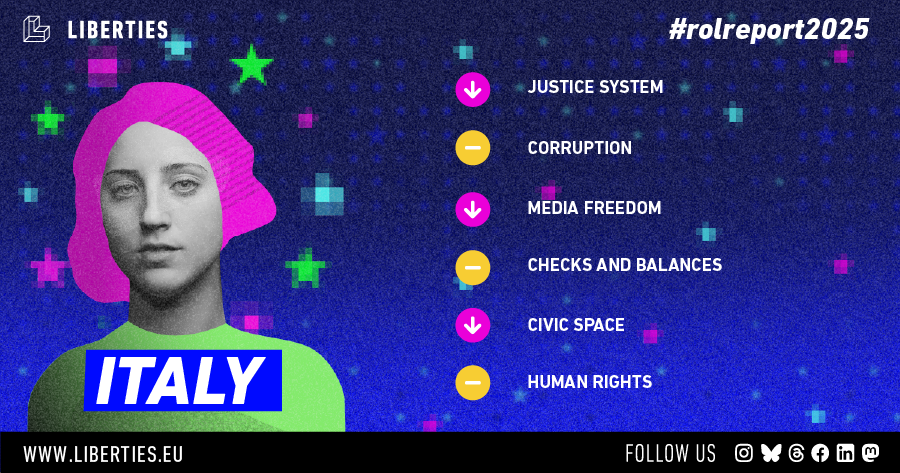Online the 2025 Rule of Law Report
Democratic Decline Deepens, EU Tools Toothless: 2025 Rule of Law Report
Liberties’ 2025 Rule of Law Report, released on March 17th 2025 has found that in 2024, Europe’s democratic decline deepened. Countries regarded as democratic strongholds are sliding towards authoritarian tendencies and the European Union’s minimal use of its rule of law toolbox barely made an impact.
In its sixth edition since 2019, the 1000-page report identifies the most striking infringements of justice, corruption, media freedom, checks and balances, civic space and human rights in the European Union in 2024. The comprehensive analysis was compiled through a collaboration between 43 human rights organisations from 21 EU countries and was coordinated by the Civil Liberties Union For Europe (Liberties). The Report is the most in-depth ‘shadow reporting’ exercise on the rule of law to date by an independent civil liberties network and its findings feed into the rule of law monitoring cycle of the European Commission. Contributing organisations present their local insights during annual country visits.
Based on the report’s analysis, Liberties categorises Italy as one of the the “dismantler” nations, alongside Bulgaria, Croatia, Romania, and Slovakia, categorised as such due to the systematic and deliberate erosion of the rule of law by their governments.
The report on Italy, elaborated by CILD in collaboration with A Buon Diritto, Antigone, Strali, and Osservatorio Balcani Caucaso Transeuropa, discusses the following critical issues:
- Regression in Italy’s Judicial System: Italy’s judicial system has regressed as reforms discussed or approved in 2024 in its regard have undermined the rule of law, and promoted an authoritarian and punitive approach that seeks to reshape the Italian judiciary drastically.
- Struggles in Anti-Corruption: Italy continues to struggle with severe corruption issues. In particular, no progress has been made in adopting new lobbying regulations or establishing an operational lobbyist register. The recent abolition of the abuse of office law and gaps in transparency and lobbying regulations pose a significant risk to conflict-of-interest prevention and anti-corruption efforts. Additionally, new whistleblower protection laws have, in some cases, been considered a step backward in protecting whistleblowers.
- Pressure on Media Freedom and the Press: Media freedom in Italy is under growing pressure, with unprecedented attacks and violations on the press, often initiated by public officials and government coalition members, who show strong intolerance toward media criticism. Furthermore, there has been a serious deterioration in press freedom in Italy, with increasing political influence over the media, physical and online attacks on journalists, and legal threats. This results in a significant restriction of freedom of expression and a decline in the country’s democratic quality, marking a serious regression relative to the previous year.
- Institutional Balance and State of Democracy: There have been no improvements in Italy’s democratic framework compared to 2023, and institutional balance is at risk due to government-backed reforms aimed at reducing parliamentary power. Overall, the recent legislative proposals raise concerns about the separation of powers, human rights protection, and democratic balance in Italy. Furthermore, the country still lacks an independent national authority for human rights protection.
- Civic Space and Fundamental Rights: Since the right-wing government led by Giorgia Meloni took office in October 2022, concerns have grown over the progressive erosion of civic space. This worrying trend has been highlighted by many civil society organisations which have been monitoring and reporting deficiencies in legislative measures affecting civil rights—particularly the right to protest, freedom of expression and the press, and the right to assembly. This regression is fueled by the strong criminalisation of activists and minorities, used as a deterrent tool to silence dissent.
- Human Rights and Systemic Issues: Discrimination against minorities and LGBTQIA+ people persists, with insufficient legislative protections. Additionally, there are serious and systematic human rights violations, particularly in migrant detention centres (CPRs) and prisons. Migrants are especially affected by discriminatory and restrictive migration policies, which reached their peak within the externalisation of asylum procedures to Albania.
Laura Liberto, President of CILD, stated:
“Overall, rule of law in Italy has worsened compared to 2023. In the field of human rights, the ongoing attacks against minorities are deeply concerning. Furthermore, government reforms threaten the democratic balance of the state, which was already weakened by excessive use of emergency decrees. The criminalisation of dissent is accelerating. In this context, CILD once again calls attention to the lack of an independent national authority for the protection of human rights.”
Balazs Denes, Executive Director of the Civil Liberties Union for Europe (Liberties), warned:
“As far-right populism grows and democracy declines in the United States, Europe’s rule of law crisis is deepening. The rising influence of the far-right threatens the EU’s unity, while Russia’s war in Ukraine and shifting transatlantic relations are testing the bloc’s resilience. To safeguard the EU and the rules-based international order, the European Commission must strengthen rule of law enforcement, linking it directly to Article 7, budgetary conditionality, and infringement proceedings.”
Download the Report on Italy
Download the full Report by Liberties





